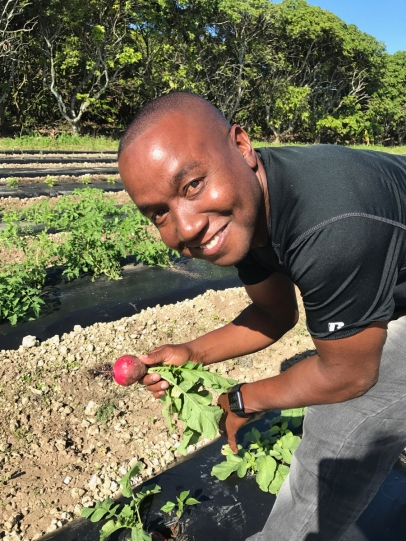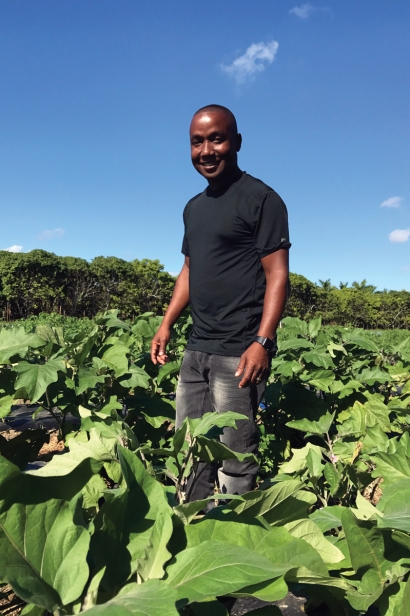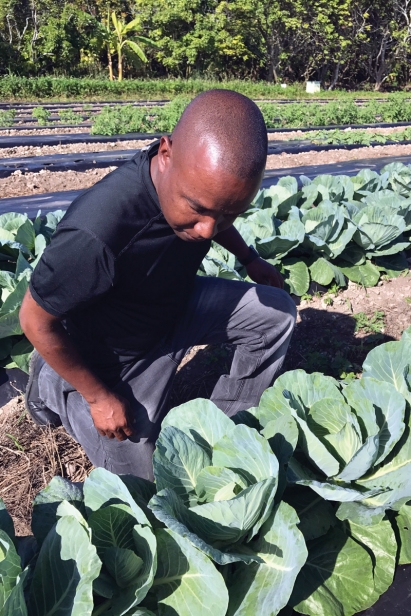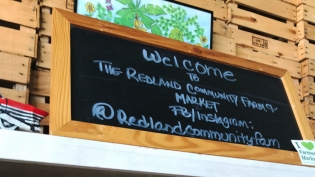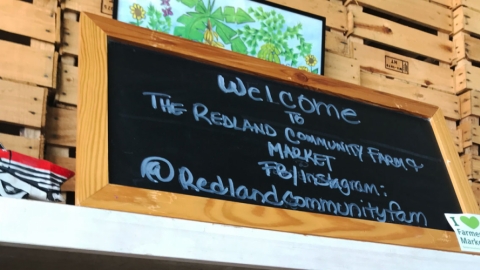Marine to Malanga
Garfield Jarrett remembers spending countless summer hours with his grandparents on their farm in Jamaica. He would wake up before the sun rose and go out into the fields with his grandfather to tend to the sugarcane, malanga, bananas, goats and other animals and crops that were on the farm. Today, he’s recreated his passion for farming at Cool Runnings Organic Farm.
Jarrett joined the U.S. Marine Corps shortly after graduating from Miramar High School and spent more than 10 years in the military and was discharged in 2008 after getting injured. He got his master’s degree in social work and wanted to merge the agricultural and clinical aspects of his life. He discovered an agricultural program in South Florida called Redland Ahead, which offers agro-educational and land lease opportunities. Jarrett completed the program and in February 2016 started his own sustainable organic farm in the Redland called Cool Runnings.
The 6.2-acre farm grows everything from callaloo to cabbage, plus chickens, ducks and goats for milk. Right now, he has about 300 chickens, 50 Cornish hens, eight goats and 26 rows for crops: tomatoes, kale, eggplant, Brussels sprouts, beets, onions, scallions and three varieties of peppers, plus avocado, lychee and longan.
Year-round Produce
Jarrett works with Bee Heaven Farm, who sells his produce at the Pinecrest Gardens Farmers Market, and works a few other markets. He also sells to Burlock Coast Seafare and Spirits at the Ritz Carlton in Fort Lauderdale. Because he focuses on crop rotation and multi-cropping, he’s a much-needed resource for farmers who stop growing in the summer, creating a little niche for himself at the market. When everyone around him takes a break during the summer, he’s able to sell his cabbage or kale for a better price.
While Cool Runnings is in the process of getting organic certification, for Jarrett, organic farming is just a catch phrase. “In Jamaica, growing up, that’s how I see everybody farm,” he says. For him, growing naturally, without pesticides or fertilizers or hormones is common sense. It makes animals less susceptible to disease. “It’s just the main sustainable way of farming. If we can get our community – not just farmers but regular community people – to start growing their own food, you will know the difference in taste from what you’re getting in the grocery stores.”
Helping Vets
He’s helping other veterans and disadvantaged teens see that by keeping them on rotation for employment and volunteer opportunities. Right now, Jarrett has one permanent employee and a recent hire who manages the farm. “Instead of the traditional modalities of treatment for PTSD (Post Traumatic Stress Disorder) and TBI (Traumatic Brain Injury), we’re looking to get them out into nature and to introduce them to farming as a different outlet,” says Jarrett. “Just as it did for me – I have been through a lot of things that many veterans have also gone through.”
Some of these veterans come from the Redland Ahead program, while others are volunteers. Students from three FIU agricultural classes use his farm as an opportunity for community involvement. While he’s balancing the farm with a new job at the local VA, Jarrett hopes he can continue to expand his dream with more acres, more animals and eventually more income to hire more employees.
Finances have been the biggest challenge for Jarrett so far. The cost of land for farmers is one of the most prohibitive aspects of starting out. But with subsidized land from the Redland Ahead program and mentoring from its founder John Mills, Jarrett was able to use the little money he had to get started and apply for a microloan. Organic farming is more expensive than conventional: Non-chemical pesticides cost much more than their chemical counterparts. A 2-gallon jug of neem, for example. can cost $95 compared to a $30 chemical alternative. “Things are overpriced just because it says it’s organic,” says Jarrett. He eventually wants to be able to use biological pests to fight other pests off, like grasshoppers to kill other bugs and control weeds.
Jarrett sees the same lessons he learned from the military with Cool Runnings: hurry up and wait. “Not everything is going to go exactly how you planned it was going to be,” he says. “You have to be adaptive and change as it goes, you know. You might set a plant to get the seeds and plant them on a certain day, but you never know if it will grow. You have to be adaptable and go with the flow.”
Eventually, he envisions his farm as a community. “People can bring their kids out and play with the animals. They can volunteer and know that we’re here and everything we grow is organic and healthy,” says Jarrett. “I have a lot of plans, but there’s a lot of time and manpower involved. But eventually, we’ll get there.”
REDLAND AHEAD
Garfield Jarrett is one of the success stories of Redland Ahead, a program started in 2013 when founder John Mills bought the land. As a veteran himself, he wanted to pay it forward to his fellow veterans and the agricultural community. The program has evolved tremendously since then by offering a veteran training program, partnering with FIU, and expanding acreage offerings. In the past year, Redland Ahead has helped 12-14 farmers complete training and gain access to land. It has also opened its doors for a farm apprenticeship program for new farmers that’s sponsored by the USDA.
Redland Country Market
Redland Ahead also supports the new Redland Country Market that launched in the fall at the Farm Life School. Market organizer Tyra Hearns says the Saturday market showcases local farmers and produce, nurseries, artists, craftspeople, bakers and others. "The idea is that the market will help generate much-needed funds to help in the renovation and restoration of the Farm Life School.”
Redland Farm Life School • 16167 SW 248 St, Homestead (Across from Knaus Berry Farm)
Open Saturdays 8:30–5:30


